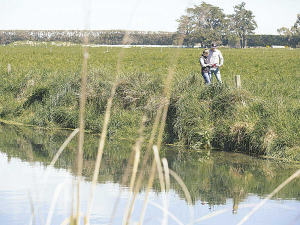Fonterra Suppliers Confident in Mainland Dairy Future
Fonterra's 460 milk suppliers in Australia, who will switch to Lactalis end of this month, are unfazed with the impending change.
 Over the last 25 years, New Zealand farmers have reduced the intensity of their on-farm biological emissions by about 20%, says Fonterra.
Over the last 25 years, New Zealand farmers have reduced the intensity of their on-farm biological emissions by about 20%, says Fonterra.
Fonterra says New Zealand dairy farmers are among the most carbon-efficient dairy producers in the world.
It points out that the emissions intensity of the co-op's NZ dairy production is approximately one third of the global average.
In its submission to the Climate Change Commission, Fonterra states that a litre of milk produced in New Zealand creates 0.91kg of CO2 emissions - compared to the global average of 2.5kg of CO2 emissions.
This efficiency has come through New Zealand's pastoral farming system, significant research and investment, and our farmers' willingness to continually adapt and improve their farming practices, it says.
Over the last 25 years, New Zealand farmers have reduced the intensity of their on-farm biological emissions by about 20%.
"These biological emissions include methane and nitrous oxide that are produced by ruminant animals, like cows, and to a lesser extent from on-farm use of fertilisers," it says.
Being a farmer owned co-operative, Fonterra says its role is to support farmer shareholders, while acknowledging the autonomy of their farming businesses.
"For many years our farmers have reduced the impact of their businesses on the environment and an example of this activity is that now 98% of waterways on their farms are fenced."
As part of its commitment to reducing the impact of farming on the environment, the co-operative employs 40 full time Sustainable Dairy Advisors who create industry-leading Farm Environment Plans for farmers.
All Fonterra farmers will have a Farm Environment Plan by 2025. Currently 43% of farmers have a plan, which is an increase from 23% in 2019, and 12% in 2018.
Fonterra says the Farm Environment Plans are the primary advisory mechanism for supporting farmers to identify and achieve good farming practices.
"These will play a core role for providing farmers with advice on good farming practise actions that the Commission has anticipated as being required to meet the emissions reductions and subsequent carbon budgets."
In October 2020, every co-operative farmer received a farm specific environmental report which combines a Greenhouse Gas Report and Nitrogen Risk Scorecard.
Understanding the amount of emissions is the first step in building our farmers' awareness of their emissions profile, how they are performing relative to their peers and in identifying efficiency opportunities, it says.
"We have 68 Farm Source retail stores across New Zealand that supply farmers the products they need on farm.
"We partner with other organisations ensuring our farmers have access to smart technology."
Committed Co-Op
Fonterra has reiterated its commitment to the He Waka Eke Noa Joint Action on Climate Change Partnership.
The targeted milestones of the partnership strongly align with the support Fonterra is currently providing its farmers, like Greenhouse Gas Reports and Farm Environment Plans.
Fonterra believes that the He Waka Eke Noa partnership provides the agricultural sector with the right forum to consider how best emissions reductions can be achieved and supported by all farmers and growers across all land uses.
Fonterra says it is an active participant within the emissions reporting, farm planning and extension work-streams.
"It should be noted that as farms are complex biophysical systems, each of these potential actions should be viewed as part of the toolbox for farmers to select and implement within a Farm Environment Plan that is specific for their farming situation."
The co-op supports the mandatory use of Farm Environment Plans across all farm systems as they are a critical tool for change.
"We have long been proactive in establishing systems and developing support capability and capacity for the rollout of Farm Environment Plans with our farmers.
"We are committed to working collaboratively to find a solution to Farm Environment Plan data collection, integration and distribution.
"We have committed to working with the Local Government New Zealand Regional Sector and others to find an integrated solution for our plans which would allow local and central Government to get access to the information they require.
"We are also seeking to work with the Government to ensure that the mandatory use of plans includes appropriate minimum standards; that plans are regularly updated and audited; and that they are delivered by appropriately qualified people."
New Zealand and Chile have signed a new arrangement designed to boost agricultural cooperation and drive sector success.
New DairyNZ research will help farmers mitigate the impacts of heat stress on herds in high-risk regions of the country.
Budou are being picked now in Bridge Pā, the most intense and exciting time of the year for the Greencollar team – and the harvest of the finest eating grapes is weeks earlier than expected.
The Real Estate Institute of New Zealand (REINZ) has released its latest rural property report, providing a detailed view of New Zealand’s rural real estate market for the 12 months ending December 2025.
Rural retailer Farmlands has released it's latest round of half-year results, labeling it as evidence that its five-year strategy is delivering on financial performance and better value for members.
OPINION: "We are back to where we were a year ago," according to a leading banking analyst in the UK, referring to US president Donald Trump's latest imposition of a global 10% tariff on all exports into the US.
OPINION: Expect the Indian free trade deal to feature strongly in the election campaign.
OPINION: One of the world's largest ice cream makers, Nestlé, is going cold on the viability of making the dessert.